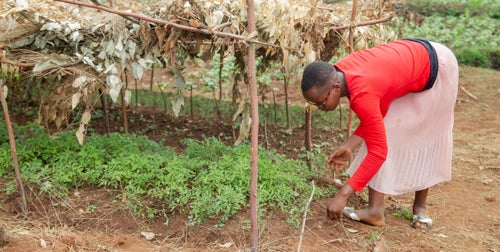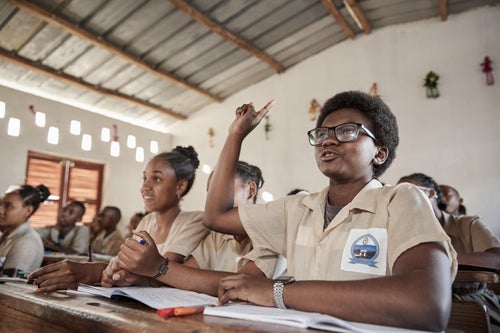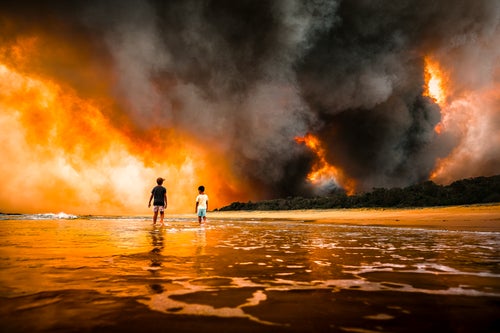In Australia and around the world, a growing number of extreme weather events caused by climate change are having a devastating impact on the lives of children. More than 1 billion young people – nearly half of the world’s children – are at extremely high risk of the impacts of climate change, and every child in the world is already affected by at least one climate shock.
In places like the Maldives, the situation is particularly concerning. Situated in South Asia, southwest of Sri Lanka and India, the Maldives is an archipelago made up of 1192 islands. While many know it as a tourist destination famous for its tropical climate and turquoise waters, it is one of the lowest-lying nations in the world, making it particularly vulnerable to climate shocks, including tsunamis, floods, and rising sea levels.
During a recent visit to the Maldives, the young leaders from UNICEF Maldives’ Climate Guardians program explained the challenges - and opportunities - they face during a recent visit from UNICEF Australia and Islamic Relief Australia, the main funding partners for the program.
The threat of climate change in the Maldives
With an average elevation of 1.5 metres above sea level, the Maldives is particularly vulnerable to the impacts of climate change. Frequent coastal storm surges leading to flooding, tsunamis, and rising sea levels threaten critical infrastructure like schools and hospitals, putting the lives and wellbeing of children and young people at risk.
Half the population, including a third of the country’s children, lives on the island Malé, while others live in geographically remote islands which lack the essential services children need to ensure a secure and safe environment. Almost a third of the population is experiencing multidimensional poverty, which goes beyond income and considers factors such as access to education, healthcare, clean water, and sanitation.
1.5 metres
On average, the Maldives sits just 1.5 metres above sea level, which means any sea level rise can potentially have a huge impact on its inhabitants.
50%
In the Maldives, more than half of the population lives on just one island, Malé. It is one of the most densely populated places in the world.
28%
More than 28% of the Maldives’ total population are multidimensionally poor, particularly regarding health and living standards.
Climate change is set to worsen these existing challenges, threatening the country’s key industries of fisheries and tourism as well as increasing food insecurity and rates of child malnutrition. Despite being surrounded by seawater, the Maldives faces a severe scarcity of freshwater, with rising sea levels, coastal storm surges and flooding eroding land, destroying crops and contaminating the country’s groundwater.
Children and young people’s physical and mental health is also being impacted. Waterborne diseases including dengue fever – which can be fatal for children – are on the rise, and children’s learning is being disrupted by severe weather events.
Ultimately, the climate crisis poses an existential threat to the Maldives, including the children and young people who live there. During their lifetime, they may be forced to leave their homes due to increasingly extreme climate disasters. Harnessing the potential of young people to be climate advocates and co-create solutions provides an opportunity for them to develop solutions to the crises faced by their communities.
Meet the Climate Guardians
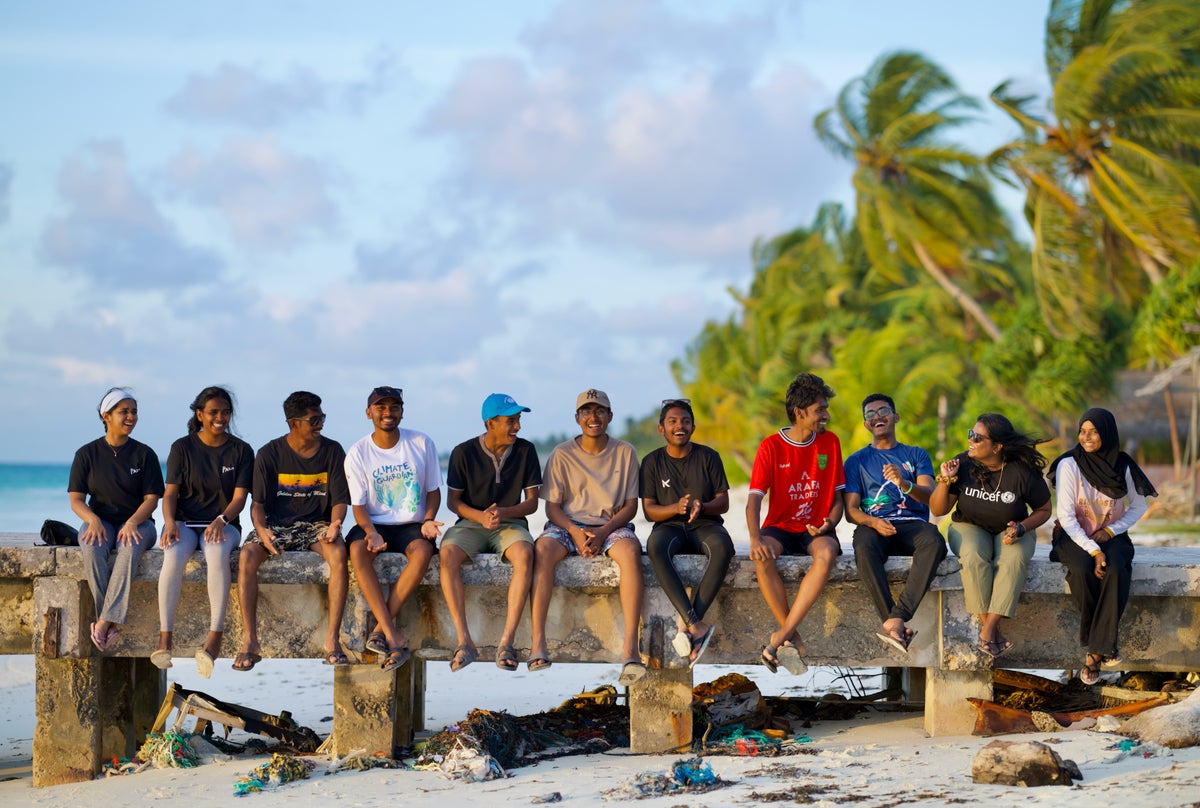
Thanks to our partnership with Islamic Relief Australia and the Government of Maldives, UNICEF Australia is supporting the Climate Guardians program in the Maldives. The program empowers a group of passionate young Maldivians – called the Climate Guardians – to speak about the issues facing their country, advocate for climate action, and present potential solutions at local and international levels. The program equips these young people with the tools, skills and knowledge to promote the development and implementation of initiatives to make their communities more climate resilient.
UNICEF is working with Climate Guardians to provide them with the opportunity and platforms to advocate for climate-resilient infrastructure such as schools and health facilities, as well as developing and implementing child-friendly Nationally Determined Contributions, Disaster Risk Reduction Plans, and other national policies and actions.
"These young people are at the heart of the program... It’s quite shocking to see the impact of climate change on the ground first-hand... but at the same time, a positive takeaway is that communities are geared up, they understand the challenge, and we are working with [our UNICEF partners] to mitigate the climate impacts."
56%
More than 56% of young people in the Maldives report that their education is directly affected by climate change, especially during their journey to school. Many young Maldivians travel by boat to school, so are exposed to extreme weather events.
77%
More than 77% of young people in the Maldives expressed their anxiety about the impacts of climate change.
92%
More than 92% of young people in the Maldives said they wanted to undertake climate action. For many Maldivian children, the climate crisis is an existential threat, and during their lifetime, they may be forced to leave their homes.
During their visit, UNICEF Australia and Islamic Relief Australia teams met Climate Guardians like 18-year-old Kalif. Kalif, who is in his final year of school, wants to study architecture at university because he is interested in how climate-resilient infrastructure can address some of the challenges his community faces.
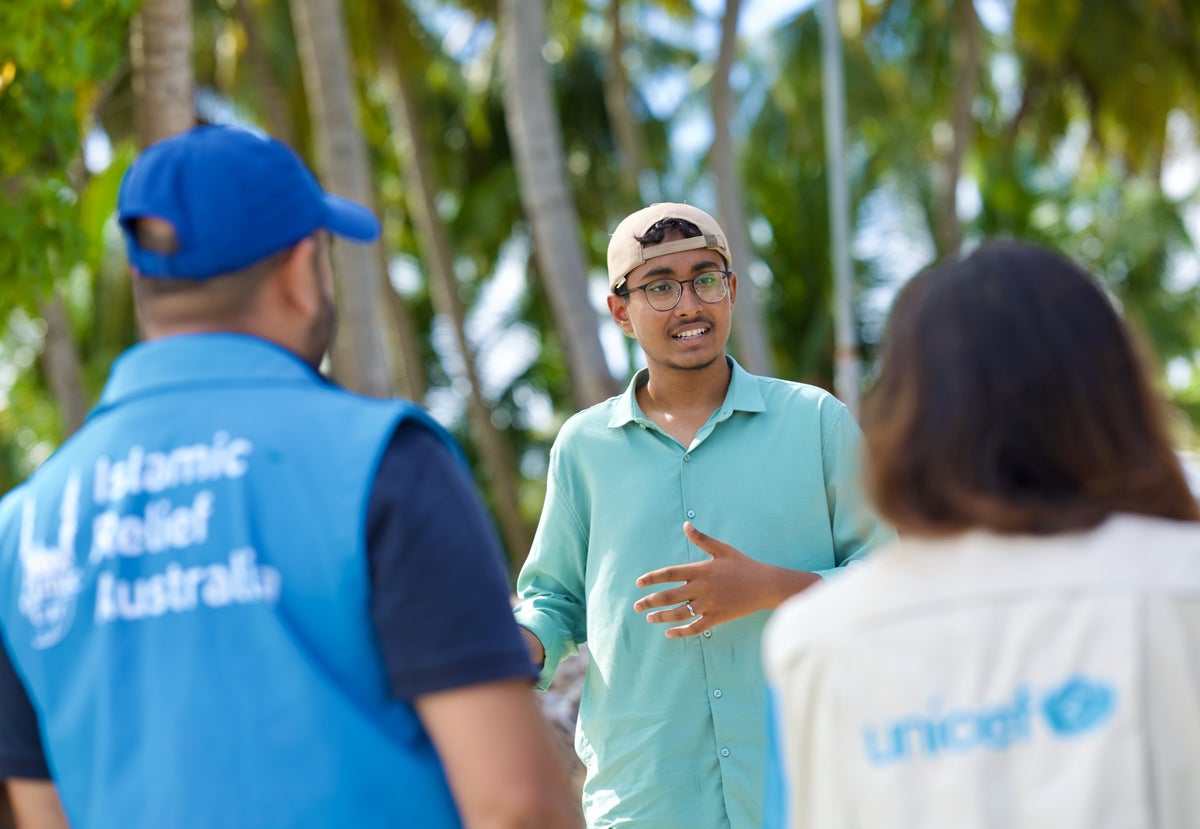
Kalif believes decision-makers must listen to the ideas and perspectives of young people to drive effective climate action but worries that some people from older generations “don’t want to listen to a youngster like me.” Instead, he is focusing on connecting with young Maldivians, educating them about climate issues and encouraging them to advocate for climate action. “Soon they’ll be the people making those policies and having the power to make a difference,” he said.
"As a Climate Guardian, I would like to raise awareness about climate change within my island so we can all as a community tackle the problem."

At the core of UNICEF's work is ensuring that children and young people have a seat at the table and can participate in decisions that impact their lives. With the support of UNICEF Australia and Islamic Relief Australia, two young people from the Climate Guardians program had the opportunity to attend COP29 in Azerbaijan, in November 2024. Ahead of the conference, they participated in training including a three-day ‘Mock COP’ with the UNICEF team. They learnt about the ins and outs of climate negotiations, networked with other like-minded young people, and contributed to a youth statement which summarised what climate actions young Maldivians want to see implemented, which can be used to advocate to key stakeholders.
"I feel like as a young person, my voice mattered. They were actively taking notes of what I was saying and then [including that in the proposal]... And I really enjoyed listening to everyone who was from a very diverse selection of islands."
Climate Guardians program facilitator and COP29 attendee Izman, 28, said: “I really like how UNICEF structured [the Mock COP], because it was very accessible for people without a super solid background [in advocacy].”
Climate change is changing childhood. Help us protect it.
UNICEF works with partners on the ground to respond to climate emergencies around the world, provide immediate and long-term assistance and help communities become more climate resilient. In the Maldives, we are also working with partners including Islamic Relief Australia to support children and young people to safeguard their futures by empowering them to advocate for climate action.
With the generosity of people like you, we can continue our work protecting every child and young person from the impacts of climate change, now and into the future. No matter what.
Climate Emergency
Climate is the biggest threat facing the world's children today. Protect them in a changing climate by donating today.
Related articles
Stay up-to-date on UNICEF's work in Australia and around the world











